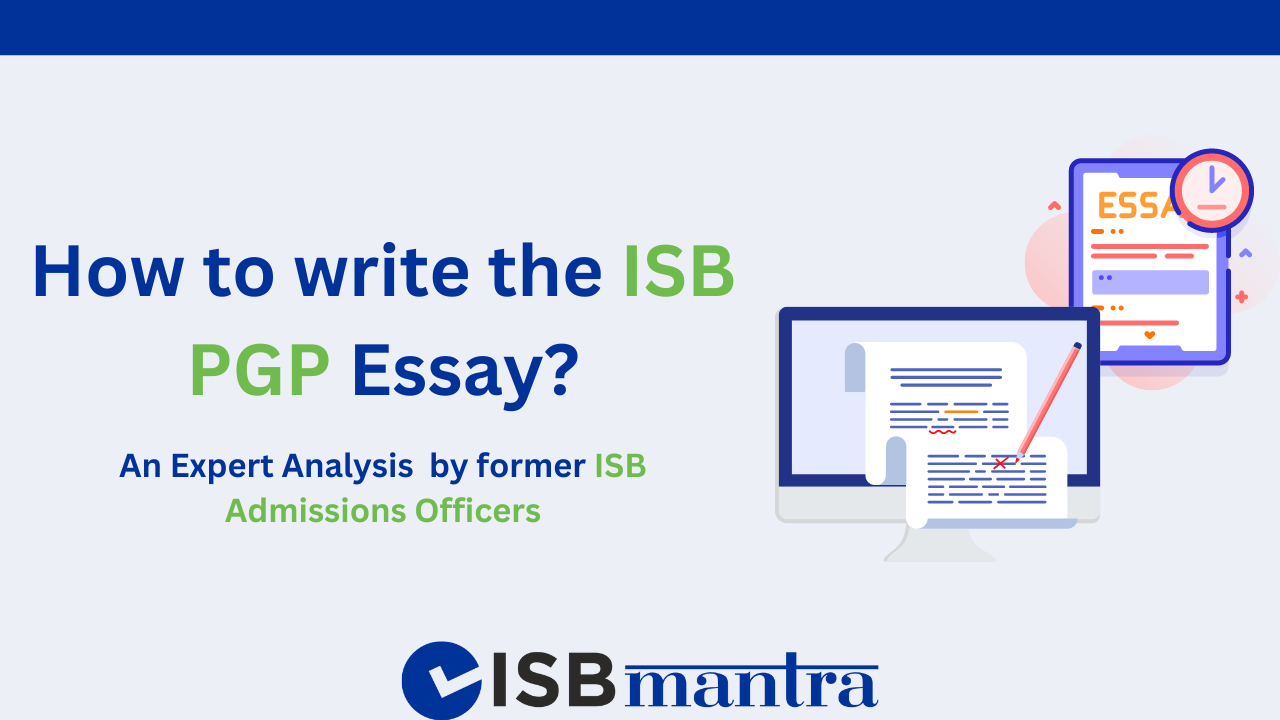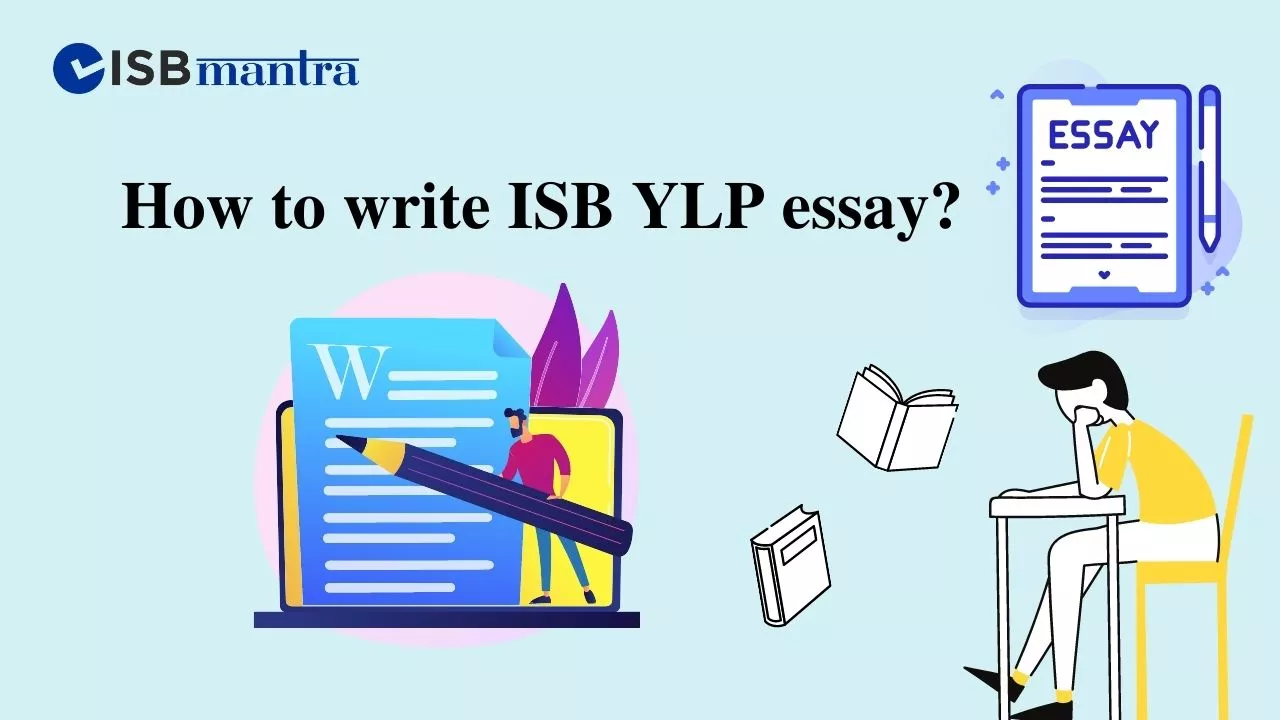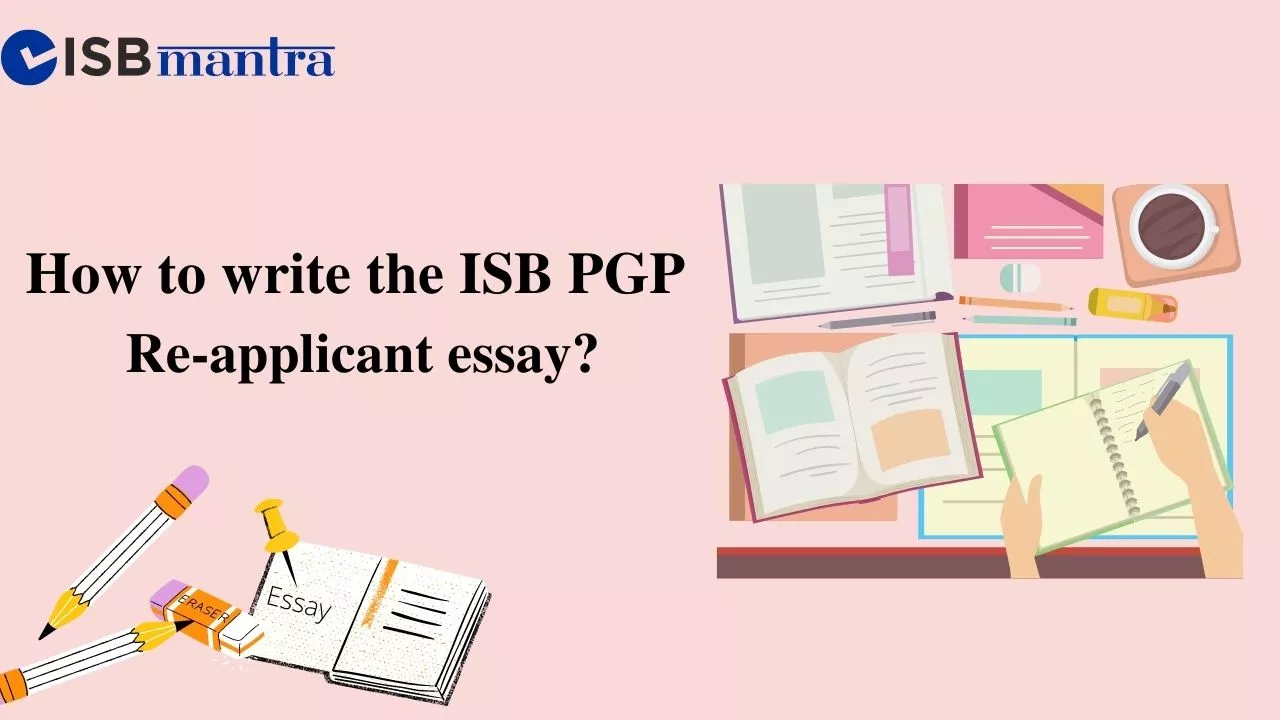This essay analysis builds on the decade-long experience of the team of Former Admissions Officers at ISBmantra, who have reviewed thousands of ISB applications as part of the core admissions team.
Business school essay prompts are an opportunity to present your profile in depth – highlighting key qualities, values, and experiences through relevant examples. The strongest responses go beyond the literal meaning of the questions and present a holistic view of your personal and professional journey, using the prompts as a base rather than a limitation.
In this article, we will analyze and share helpful tips on how to write the ISB essays for the 2026 admissions and also share a few ISB sample essay structures to solidify your understanding.

Understanding ISB’s Expectations
ISB looks for candidates who can thrive in its high-paced, one‑year program, excel in a competitive peer group, and position themselves well for post‑MBA recruitment. Given the intensity (placements begin just over six months in), your essays should help the admissions team assess:
- Quality and impact of your past experience
- Evidence of learnability and resilience
- Ability to manage people, projects, and/or complex problems
These factors are as important for admission as they are for post‑MBA employability. Keep them in view as you select stories and structure each essay.
For the 2026 intake, you must answer 2 mandatory essay questions for the Post Graduate Programme (PGP). The word limit for both essays is 400 words. Additionally, the application provides the opportunity to answer an Optional Essay with a 250-word limit. If you are a re-applicant, you are required to answer a re-applicant essay in no more than 200 words.
ISB PGP Essay Questions for 2026 Intake
- What unique experiences have shaped who you are? What have these experiences taught you about leadership and the kind of leader you aspire to be? (400 words)
- What intellectual experiences have influenced your approach to learning and have led you to pursue an MBA? Please describe using anecdotes from your own experiences. (400 words)
- Share with us any intellectual pursuits, unique perspectives, or experiences that you pursued that have shaped your worldview, your growth through these pursuits, and how they could potentially contribute to our learning community. (Optional – 250 words)
- Re‑applicant Essay: What are the key personal and professional developments since your previous application at ISB, that you would like to highlight to the admissions committee? (250 words)
At ISBmantra, with our Core Team of Former ISB Admissions Officers, we have mentored 3000+ applicants over the last 12 years. Here is our analysis of the ISB PGP 2026 Application essays.
ISB PGP Essay 1 Analysis
What unique experiences have shaped who you are? What have these experiences taught you about leadership and the kind of leader you aspire to be? (400 words)
First things first – it’s a business school application and not an essay writing competition. Before you start compiling key points and stories to be communicated through this essay, ask yourself if these points and stories will be relevant to a business school.
To answer this question, break it down into three parts –
- Formative experiences (personal and/or professional) that shaped your values, decision‑making, and people‑leadership style.
- How these experiences define/influence your leadership style.
- How you envision honing your leadership style/qualities further.
Identify experiences that were “foundational” enough to “shape” you in certain ways. These need not be from your childhood. A certain experience in college, for instance, can transform your perspective about taking initiatives. A certain experience at work in your initial days can teach you empathy. Since the essay prompt asks for experiences that “shaped who you are”, it is very less likely that a very recent experience would fit in here so well.
Extract clear leadership takeaways from these experiences. Discuss how the experiences shaped your leadership perspective and style. With these learnings, what kind of leader do you aspire to be? What are some of the leadership qualities that you further seek to develop?
If space permits, show evidence of application — how you’ve already exercised these lessons.
End with a forward‑looking leadership aspiration that naturally grows from these lessons.
Choosing the right material: – Prefer high‑context, high‑stakes moments over generic wins (e.g., influencing senior stakeholders without authority; steering a team through ambiguity; taking an unpopular but ethical stand; building from scratch under constraints).
ISB PGP Essay 1 Sample Structure
1. Opening theme: Your leadership north star (e.g., “I lead by designing clarity in chaos,” or “I’ve learned to move people through empathy and evidence.”)
2. Formative Experience #1: Context – Challenge – Actions – Outcome – Leadership lesson (e.g., influence without authority, bias‑to‑action, stakeholder mapping, psychological safety).
3. Formative Experience #2: Different setting that complements #1 – Actions – Outcome – Leadership lesson (e.g., coaching others, building mechanisms, ethical decision‑making, resilience).
4. Mini‑application vignette (1–2 lines): A quick example where you applied a prior lesson to deliver impact.
5. Aspirational close: The kind of leader you’re becoming and how you intend to scale these behaviors in larger, more complex settings – during ISB, as well as Post-ISB.
Leadership lenses you may explore (pick 2–3):
Direction: framing problems; setting hypotheses; prioritization
Alignment: stakeholder mapping; collaboration; conflict resolution
Execution: effective planning; building SOPs; review cadences; course‑correction
Empowerment: coaching; feedback loops; training; inclusion
Judgment: ethics; risk-taking; long‑term vs short‑term choices
ISB PGP Essay 2 Analysis
What intellectual experiences have influenced your approach to learning and have led you to pursue an MBA? Describe using anecdotes from your own experiences. (400 words)
This question is worded interestingly to explore the gaps in your current skillset and the intellectual experiences that have enhanced your knowledge, skills, and approach. Since the question directly connects these experiences with your decision to pursue an MBA, the anecdotes/instances/stories must balance presenting a strong candidature with the need for an MBA.
The simplest way to do so is to present 2-3 of your best professional examples, where you were a part of some exciting project/initiative, how the projects were challenging and intellectually stimulating, how they allowed you to work with smart people/stakeholders, and how in the process, you discovered your own potential to do better by augmenting your skills. Be careful not to present yourself as an external observer while narrating these anecdotes. These are supposed to be “experiences”, and you would rather show that your involvement and contribution was significant enough.
Can these “intellectual experiences” be from outside the workplace? Probably, yes! Preferably, no! If you have some non-work related stories that are worth telling, try your best fitting them in the first essay. But if you think that the story/experience relates really well with the need for an MBA, and connects fairly well with your future plans, then why not!
Should this also be the place to present your career goals and why ISB? This is a very nuanced decision, so read this carefully –
- In terms of your learning and skillset, an MBA will have the maximum impact on your short-term plans – hence you may use a few lines to present your short term plans but not try to go too deep into discussing what you would like to do 10 years from now.
- This isn’t a generic “Why MBA” essay. So try to keep this section short, and specific to the capabilities that you directly associate with your short-to-medium term success.
- If this were a dedicated “Why MBA” essay, we could have taken the liberty to discuss “Why ISB” as well – certainly not in this section and not in this essay!! You will need to focus on experiences and anecdotes, so let’s focus on those, without trying to please ISB by telling them that they have the best profs and the best curriculum and the best infrastructure in the world.
ISB PGP Essay 2 – Sample Essay Structure
- Skip the introductory paragraph that you were planning and dive straight into your first story.
- Conclude the first story with how the experience enriched your learning, perspective, and outlook. Control your urge to talk about the need for an MBA already. Let this be a build up to the concluding paragraph.
- Follow the Situation-Task-Action-Result format, but invest most space in detailing the challenges and your response to them.
- Transition to the next story or situation. Touch upon what you learnt and how you would like to further that learning to perform better.
- Add another experience/story if space allows
- Pack a punch with a good summary of your experiences, how they allowed you to develop some exciting skills, opened you to the need for an MBA to challenge yourself further, and grow in your chosen field, industry, etc. (provide a line or two of specific details here).
A tight way to tell each story: STAR + LEE – S/T/A/R: Situation – Task – Action – Result – L/E/E: Learning (concepts, frameworks, methods) – Evolution (how your approach changed) – Extension (how you reapplied it later).
Recommended flow:
1. Dive straight into Experience #1: Set the intellectual challenge; show your method (frameworks, experiments, models), the trade‑offs you weighed, and what you learned.
2. Experience #2: Different domain/skill (e.g., from analytics to GTM; from operations to strategy). Again, emphasize method – learning – evolution.
3. (Optional) Short Experience #3 if it adds a new dimension (e.g., cross‑cultural or interdisciplinary learning).
4. Conclusion: Name 2–3 capabilities you now aim to formalize at ISB (e.g., strategy under uncertainty, data‑driven decision‑making, organization design, product leadership, corporate finance). Relate it with your future plans.
Avoid:
A résumé rehash; claims without method; long “why MBA” paragraphs; hobby stories without analytical depth.
ISB PGP Essay 3 (Optional) Analysis
Share intellectual pursuits, unique perspectives, or experiences that shaped your worldview and how they could contribute to our learning community. (250 words)
This is not a “miscellaneous achievements” parking lot. Treat it as a differentiation + contribution essay that answers two questions succinctly:
- What is uncommon about you?
- How will that tangibly benefit your peers at ISB?
Write it only if you can showcase credible uniqueness and a clear peer-learning payoff. Which also means that not writing this essay comes at the cost of not being able to establish how exactly you will be a valuable addition to the class (unless you strongly feel that the other essays are already doing that job for you).
What the prompt is really asking:
- Identify intellectual pursuits or perspectives that gave you a distinctive way of seeing or solving problems (depth in a domain, bridging two fields, cross-cultural lenses, or creator/entrepreneurial work).
- Show growth from those pursuits (skills, mindset shifts, judgment).
- Translate that uniqueness into specific contributions to the ISB learning community (clubs, projects, case preps, workshops, speaker connects, ELP/practicum).
Choosing the right material:
- Pick one primary USP (and at most one supporting angle). Fewer, richer examples beat lists.
- Favor repeatable capabilities over one-off wins.
- Ensure professional relevance (peers must be able to learn/apply it in cases, projects, or recruiting preps) instead of vague skills that may not find good relevance in an MBA program.
Two effective patterns:
1) Depth: “I bring unique depth in X” (industry, function, or craft) – how it shaped your worldview – how peers benefit (case discussions, projects, treks, speaker connects).
2) Breadth: “I bridge X and Y communities” (e.g., Engineering – Policy; India – SEA) – worldview – how peers benefit.
What is “Worldview” (in this case)?
The term “worldview” can be misleading if you try to apply the literal meaning. Relate it to “your world” in this context – which is your industry, your function, your organization, the teams that you work with, the professional values that you have developed, etc. Therefore, worldview, in this case, isn’t necessarily global perspective. It is just your perspective about the world you are contributing to.
ISB PGP Essay 3 – Sample Essay Structure
- Crisp Summary of your USPs (40-50 words): List your key differentiators and specific areas/domains/functions you can claim expertise in.
- Illustration #1 (80-100 words): Context – what you pursued – what made it intellectually demanding – what you learned – how it changed your worldview.
- Illustration #2 (optional, 60–80 words): A complementary vignette that shows the USP in a different setting (cross-functional, cross-cultural, or entrepreneurial/intrapreneurial lens).
- Contribution (60–80 words): 2–3 specific ways you will enhance peer learning at ISB (club roles, workshops, case preps, ELP/practicum, founder support).
DO NOT make this is a “Why ISB” essay. This essay is about “You” and how you will contribute at ISB, instead of presenting how you will benefit from opportunities at ISB.
ISB PGP Re-applicant Essay Analysis
What are the key personal and professional developments since your previous application? (250 words)
Almost one-fourth of the applicants at ISBmantra are reapplicants to ISB. Being a reapplicant doesn’t put you to any disadvantage at all! Rather, an improved test score, profile, and application, places you in a good position to get the attention of the admissions team.
What is the reapplicant essay asking?
Since your last application to ISB, did you create opportunities to enhance your skills? You presented certain career goals in your last application. Did you take up professional initiatives and self-learning opportunities to move towards your professed career goals? Did you assess what might have gone wrong, talked to alumni and industry experts, and attempted to position yourself better this year?
If your GMAT score was not good enough, were you willing to push yourself and retake the test? If you end up scoring the same again – the school will still appreciate your intent and your commitment to the goal of doing the MBA at ISB.
Talk about the new projects, new learnings from these projects, things that you got to do for the first time, and interactions you have had that had an impact on you and your career plans. Do not forget to include the experiences that helped you refine your core and soft skills further.
If you presented a goal or a career plan last year that you failed to justify in the interview; or if, after more thorough research, you have decided to opt for an alternative plan that you can validate, do not hesitate to make a statement.
Feel free to present the specifics of the research you engaged in to arrive at a more rational career plan (if you have a different career plan now). For all logical purposes, this is a better approach than presenting the same career plans again, when you are not too confident about being able to substantiate them in the interview.
Content Ideas:
- New scope/impact: promotions, expanded ownership, bigger teams/budgets, first‑time initiatives
- Skill upgrades: certifications, toolkits, languages, domain depth; how you applied them
- Goals sharpened: refined post‑MBA plan with better evidence, stronger connects with target industry professionals, etc.
- Stronger Intent to apply to ISB: Connectiong with ISB alumni, etc.
ISB PGP Reapplicant Essay – Sample Essay Structure
1. Open with momentum: one‑liner that signals upward shift
2. Two concise proof paragraphs (scope/skills – results)
3. Close with readiness: why you’re a stronger bet for ISB now
Breaking down the ISB Admissions process with Former Sr Admissions Manager
Richa Agarwal, Sr Admissions Manager at ISB, shares insights about how to get an admission at the Indian School of Business, speaking about various topics such as:
- Standing out from the rest of the PGP applicants
- How to deal with a low GMAT/GRE score
- What does ISB look for in its candidates and much more
Make sure you watch the video if you are applying to ISB this year –




Comments are closed.